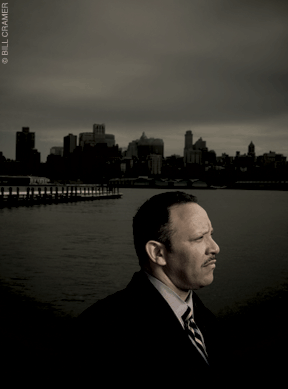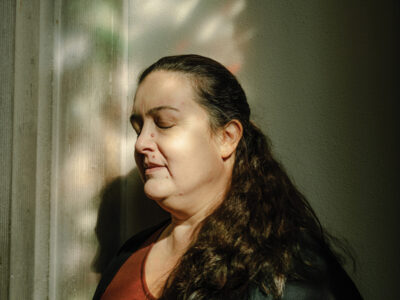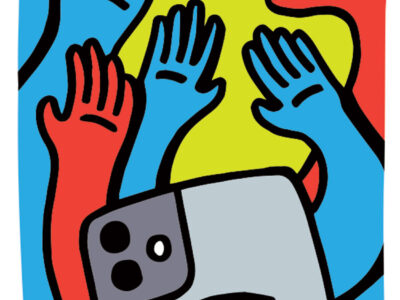
Former New Orleans mayor and current president and CEO of the National Urban League Marc Morial C’80 is on a mission to reclaim the organization’s role as the economic voice of black and urban America and of all those who are “weak, disadvantaged, and dispossessed.”
By David Porter | Photo by Bill Cramer
The two men stood on the stage of the Detroit Marriott Renaissance Hotel ballroom last summer, one black and one white, with vastly different political beliefs and backgrounds—yet united in their lineage as the sons of famous men who had chosen to follow their fathers into public service, trading on their family name but intent on carving out their own legacy.
The occasion was the 2004 annual conference of the National Urban League, at which one of the men—Marc Morial C’80, NUL president and CEO and former mayor of New Orleans—played host to the other, President George W. Bush.
Of Bush’s praise of Morial as “a good man” who “cares deeply about the people in our country,” all the lifelong Democrat will say, with a wry smile, is that “politics makes strange bedfellows.” He prefers to call attention to the fact that the president’s appearance made the Urban League one of the very few non-military or veteran’s groups able to snag both Bush and Democratic challenger John Kerry to speak at its conference in the course of last year’s increasingly rancorous election campaign.
“That made a powerful statement, I think, about what we are and who we are at the Urban League,” Morial says during an interview in his corner office at NUL’s headquarters at the southern tip of Wall Street, the sun reflecting off the waters of Upper New York Bay in the background and the steady thrum of traffic providing a backbeat below.
The 46-year-old Morial speaks in measured tones, choosing his words with care as he articulates the challenges that face the NUL, a racially diverse organization that has traditionally had a lower profile than the more strident NAACP, but one that has been an effective force for change in its nearly 100-year history. His demeanor belies the basic fact that in his professional life at least, this is a man who seems to want things done in a hurry, on his own timetable—first as a state senator in Louisiana in his early thirties and then as the highly popular two-term mayor of New Orleans starting at the age of 36, a period in which, among other initiatives, he led a groundbreaking effort to hold the gun industry accountable for the toll its products were taking on inner-city lives.
“The challenges that face the Urban League are the challenges that face urban America and black America,” Morial says. Four decades after the passage of the Civil Rights Act and 50 years after Brown vs. Board of Education, moving into the 21st century the focus is on closing the economic gaps that still exist. Morial calls economic issues “the last frontier in the civil-rights movement.”
“I’m prepared to say that things are better in many ways than they were 40 years ago,” he continues. “The numbers show that in many respects. However, it’s so paradoxical. Because you can say, for example, that the poverty rate among African Americans has been cut in half. And that’s significant. But it’s still three times higher than it is for white America.
“As things have gotten better for the nation as a whole in many areas, the tide has risen. But the boats at the bottom of the tide have remained at the bottom of the tide.”
To illustrate his point, Morial produces the latest edition of The State of Black America, a collection of essays and reports that the Urban League has been producing regularly since 1976. The 2004 volume, subtitled The Complexity of Black Progress, added a new feature, the Equality Index, which measures how black America stacks up against white America in several key areas first enunciated by Morial in his inaugural address as president of the organization as part of what he called a five-point “empowerment agenda.” They include: education and youth, economic empowerment, health and quality of life, civic engagement, and civil rights and racial justice. (More information about the index is available at the NUL’s website, www.nul.org.)
The analysis is sobering. Using census reports and econometrics to quantify the relationship, the study concludes that if white Americans are considered the model, or 1.00, then black Americans are currently at 0.73 compared to the conditions of whites. Referring to Article 1, Section 2 of the U.S. Constitution, in which blacks were counted as three-fifths of a white person for purposes of taxation and representation in Congress, the Equality Index authors point out that, in the intervening 217 years since the ratifying of the Constitution, blacks have advanced only from having roughly 60 percent of the status of a white person to today’s 73 percent.
The NUL under Morial is attacking the continuing economic disparities through a variety of initiatives. One program funded in part by a $900,000 grant from Citigroup teaches people “financial literacy”—that is, how to effectively manage bank accounts, investments, and credit. Other programs have created youth job-training centers at 15 NUL affiliates and digital “empowerment academies” for computer training in 10 other locations. A partnership with Baton Rouge-based Stonehenge Capital Company has created, with the help of federal tax credits, a $127.5 million fund to invest in, and provide financial counseling to, small businesses located in low-income communities.
In his keynote speech at last year’s conference, Morial said that during his tenure the Urban League must “reclaim our historic role as the economic voice of black America, of American cities, of people of all colors who are weak, disadvantaged and dispossessed.”
Few people seem as qualified to survey the rocky road of racial progress in this country as Morial. For starters, there is his background in New Orleans, a roiling gumbo of French, Spanish, Native American, and African influences that he characterizes as “a mature city before it was an American city,” a onetime slave port and entry point for travelers headed inland via the Mississippi River. By the 1960s and 1970s New Orleans was slowly evolving from its segregated past, and Morial witnessed these changes as a child, in small ways like being allowed to play for the first time against the white teams in the city’s sandlot football league, or being one of the first black students at newly desegregated city schools.
“It was a very interesting time in New Orleans, and Marc was in an interesting position there,” recalls Ellis Henican, a childhood friend who went to school with Morial and now writes a column for New York Newsdayand is a regular commentator on Fox News Channel. “Marc was a tremendously charming, articulate, self-confident kid in an environment that would have drained that out of almost anybody.”
Morial also saw the city’s evolution writ large in the efforts of his parents, Sybil and Ernest “Dutch” Morial, and others who were in the vanguard of the civil-rights movement in the South. Dutch Morial was the son of a sharecropper and among the first of his family’s generation to attend college, and would later become the first black student to earn a law degree from Louisiana State University, the first since Reconstruction to be elected to the Louisiana House and, eventually, the first black mayor of New Orleans. He also served as the head of the local branch of the NAACP.
Morial remembers his parents being involved in “everything conceivable” in the community and considering those activities as important as the jobs that paid them a living wage. As a 6- or 7-year-old, he would accompany his father to his law office on Saturday mornings, then spend the rest of the day with him stopping by community events, meetings, or political rallies. Those experiences are the ones that shaped his views and affected the path his life would take in ways he was not even aware of at the time, he now says.
Dutch Morial didn’t push his son into politics; rather, he counseled him to follow the examples of second-generation Irish, Italians, and Jews. “‘Study them,’ he’d say,” Marc recalls. “‘The first generation got involved in politics in the big cities, and the second generation concentrated on building businesses and economic infrastructure.’”
The political bug had already bitten, though, according to Henican:
“Marc was always interested in political stuff. I remember him telling me as a seventh- or eighth-grader about how you could go and be a page at the state legislature, and they’d pay you what sounded like a princely sum, it was probably something like $25 a day. Considering the amount of money I had in my pocket—and I’m sure he had in his—it seemed like a lot. As time went on, we were both drawn to that.”
First came a sojourn north to Philadelphia and Penn, where he arrived in the fall of 1976 with money for cab fare from the airport to take him to a school he had never seen before and where he knew no one save for a fellow Jesuit High graduate who was three years ahead of him.
Still, the choice of Penn was not as odd as it may seem. Morial’s parents were familiar with the Northeast—his mother had attended Boston University and married his father in Boston, and they might have stayed there had Dutch Morial not returned to the South in the late 1950s to work as a civil-rights lawyer, Marc says. And both parents stressed education first and foremost.
“It was set, quite frankly, at a very early age in my life that we were going to school in the Ivy League,” he says. “My parents preached that you were going to go to the best school you could get into.”
He soon found his way on campus, becoming active in the Black Student League and friendly with some of the players on the 1978-79 basketball team that reached the NCAA Final Four. Morial felt the pull of the corporate world as he watched some classmates lining up for positions with Fortune 500 companies—but two events served to reinforce his roots and dull the allure of a management-track job.
One occurred during the fall of his sophomore year, when, after working a construction job in New Orleans, he stayed on to help with his father’s successful mayoral campaign in the fall of 1977. The other came during the summer between his junior and senior years when he worked in Washington for Louisiana Senator Russell Long, the chairman of the Senate Finance Committee and one of the four or five most powerful men in Congress. Morial sat in on meetings that involved the likes of Senators Edward Kennedy and Robert Dole. It was heady stuff for a 21-year-old, even one with a big-city mayor for a father.
“That was an unbelievable experience,” Morial says. “I think that exposure was very much a turning point.”
Morial’s experience at Penn was also shaped by the takeover of College Hall and subsequent sit-in of March 1978. What began as a volley of protest over the cutting of arts programs and several minor sports teams quickly morphed into a forum on university governance and student input. Black students seized on an opportunity to have their concerns heard, and by the time a list of resolutions was put on paper after nearly four days of negotiating, 10 of the 31 involved minority representation on Penn’s campus, including a commitment to form what became the United Minorities Council.
“I think the African-American students thought, ‘People are protesting about a hockey team, and we have some ways we think the University ought to respond to us better,’” Morial says. “It was a little bit of piggybacking and a little bit of us thinking about getting what we thought were some more serious demands on the table.”
Morial graduated from Penn in 1980 with a degree in economics and African-American studies, and then went on to Georgetown University for a law degree in 1983. After a two-year stint as a state senator in Louisiana and an unsuccessful run for Congress, he was elected mayor of New Orleans in 1994—the third black candidate to hold that office. He won office in a divisive runoff election against fellow Democrat Donald Mintz in which the vote split along racial lines, with Morial taking 54 percent of the total vote but gaining 85 percent of the black vote, while his white opponent garnered 91 percent of the white vote. He inherited a city riddled with an entrenched culture of police corruption, decaying streets, and a murder rate so high that it earned New Orleans the tag of “Murder Capital, U.S.A.” The timing was perfect for a young, energetic candidate possessing what one local columnist characterized as “smarts, vigorousness, and the width of political support to undertake major reforms.”
In Morial’s eight years in office, the crime rate dropped and wide-ranging reforms helped clean up the police department. His approval ratings soared into the 70s, making him one of the most popular mayors in decades.
He accomplished this feat with an approach that was different from that of his father, who had died of asthma in 1989 at age 60. “His father was very fiery and in-your-face; you knew exactly where he stood, and he didn’t run from controversy, to put it mildly. He liked controversy,” says veteran pollster Ed Renwick, director of the Institute for Politics at Loyola University in New Orleans. “Whereas Marc is much smoother, much more ‘Come, let us reason together.’ He comes across as a nice person. So they had very different styles of leadership.”
For his part, Morial says he never felt pressure to be like his father, recalling, “There were people who said, ‘I wish you were more like your father,’ and there were other people who would say, ‘I’m glad you’re not like your father.’ It was a mixed bag. He would tell me that we were from different times. Everything he got he had to fight for, at every turn of the road. In my career, I was able to stand on his shoulders, in a way.”
The prevalence of gun-related deaths in New Orleans and other cities spurred Morial and other mayors to consider the bold step of holding the gun industry accountable for some of the costs of gun violence, much as the states had done successfully in suits against tobacco companies. In 1998, Morial was the first to file suit, against 15 gun manufacturers, three trade associations, and several local pawnshops and gun dealers. The suit sought to “recover the damage to the city from the gun industry’s sale of guns that are not ‘personalized’ to incorporate safety designs to prevent their use by children and other unauthorized users.” The Louisiana legislature ultimately passed two laws preventing the city from pursuing the suits, but a point had been made. Morial says he would take the same course of action again, despite the predictable backlash from the gun lobby.
“I’m not an anti-gun person. I’m not an anti-hunting person. But my own view on the issue has to do with the fact there’s just a proliferation of military-style weapons in inner-city communities,” he says.
If Morial is convinced of the efficacy of the gun suits, he is less sanguine about his unsuccessful—some say ill-conceived—attempt to change New Orleans’ charter to permit him to run for a third term as mayor after winning his second term in a landslide. The measure was defeated soundly by voters in 2001.
“The whites didn’t want it, period; they never supported the third term for anybody, black or white,” says Renwick. “And a lot of the black politicians didn’t want it because they felt it kept them from progressing. They wanted some of the office and the power. So for different reasons, he ended up with a biracial coalition against him.”
Morial says the September 11, 2001, terrorist attacks sapped some of his enthusiasm for the campaign, and there is a wistfulness in his voice as he reflects on the defeat that closed his tenure in New Orleans. “It’s clear that the charter change affected the way people looked at me,” he says. “It was a long-shot campaign. Nobody’s perfect. But I’ve been pretty successful by being a risk-taker. Looking back, I think my batting average was pretty good.”
After the end of his mayoral term in 2002, Morial had returned to law practice briefly before being tapped to lead the Urban League in May 2003, succeeding Hugh B. Price, the organization’s head since 1994. The three previous presidents or chief executives—Whitney M. Young Jr., Vernon E. Jordan Jr., and John E. Jacob—also served at least nine years at the helm, which gives a little more weight to Morial’s comment that it is “highly unlikely” that he will seek elected office again, in large part because of the toll it can take on families.
“It’s really not in my plans,” he says. “I never got into politics to make it a lifelong career.” Morial is married to New Orleans newscaster Michelle Miller, with whom he has a son, Mason, who turns three in April. The couple was dubbed one of Ebony magazine’s “Ten Hottest Couples” in 2000. He also has a daughter, Kemah, 23, from a previous relationship.
Henican, a veteran TV commentator, thinks his childhood friend could use his platform to reach a wider audience.
“In the cable-TV talking-head network, there isn’t really a first-string core of go-to people among young black leaders,” he says. “The country is ripe for a next generation of black leaders. The Jesse Jacksons and that generation are more or less at the end of the line. Somebody will emerge, or a couple of people.”
He mentions newly elected Illinois Senator Barack Obama, who gave the keynote address at the 2004 Democratic Convention, as one likely voice. But by virtue of his upbringing and political background, his strong relationships with other black leaders, and his personal skills, he says, “I think Marc is uniquely positioned do that.”
David Porter C’82 writes for the Associated Press and is the Gazette’s regular sports columnist.




